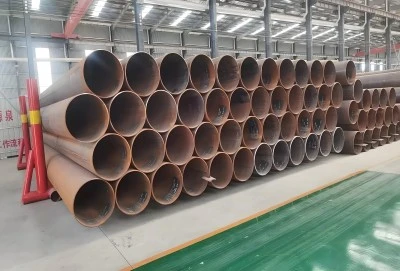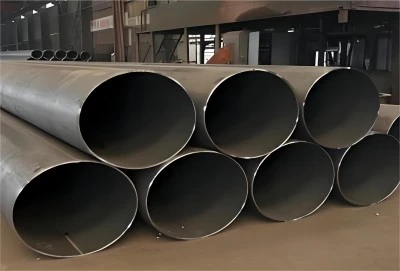API 5L X60 pipe specifications represent a crucial standard in the oil and gas industry, defining the requirements for steel line pipes used in transportation systems. These specifications are developed by the American Petroleum Institute (API) and have been harmonized with ISO 3183 to ensure global consistency in pipe manufacturing and application. API 5L X60 pipes combine high strength with excellent toughness and weldability, making them essential components in modern pipeline systems. Understanding the detailed specifications of these pipes is vital for engineers, contractors, and industry professionals involved in pipeline projects.
|
|
|
Standard: API 5L / ISO 3183
The API 5L specification, harmonized with ISO 3183, provides comprehensive guidelines for the manufacturing and testing of steel line pipes. This standard encompasses various aspects including chemical composition, mechanical properties, dimensional requirements, and testing procedures. The harmonization between API 5L and ISO 3183 has created a unified global standard that facilitates international trade and ensures consistent quality across different manufacturing regions.
These standards specify rigorous testing requirements including hydrostatic testing, non-destructive examination (NDE), and mechanical property verification. The hydrostatic test pressure is calculated based on the pipe size, wall thickness, and specified minimum yield strength. Non-destructive examination methods such as ultrasonic testing or radiographic inspection are employed to detect potential defects in the pipe body and weld seams.
Quality control measures outlined in these standards include requirements for material traceability, marking, and documentation. Each pipe must be marked with specific information including the manufacturer's name, pipe grade, manufacturing standard, and heat number. This information ensures proper identification and traceability throughout the supply chain and during installation.
Grade: X60, L450, PSL1, PSL2, SOUR SERVICE
The X60 grade pipe designation indicates a specific strength level within the API 5L specification. L450 represents the equivalent designation in the ISO system, where 450 refers to the minimum yield strength in MPa. The relationship between these designations demonstrates the harmonization between international standards and provides clarity for global procurement processes.
Product Specification Levels (PSL) define different sets of technical requirements. PSL1 represents standard requirements while PSL2 includes additional specifications for chemical composition, mechanical properties, and testing procedures. PSL2 pipes typically undergo more stringent quality control measures and are often preferred for critical applications where reliability is paramount.
Sour service requirements apply to pipes intended for use in environments containing hydrogen sulfide (H2S). These pipes must meet additional requirements for hardness, chemical composition, and heat treatment to prevent sulfide stress cracking. The manufacturing process for sour service pipes includes careful control of cooling rates and verification of microstructure to ensure optimal resistance to H2S-induced cracking.
Minimum Yield Strength: 60,200 psi (415MPa)
The minimum yield strength requirement of 60,200 psi (415MPa) defines the fundamental mechanical property of X60 grade pipes. This strength level provides an optimal balance between structural integrity and fabrication characteristics. The yield strength is verified through standardized tensile testing procedures performed on samples taken from the pipe body and weld seams.
Beyond yield strength, X60 pipes must meet specific requirements for tensile strength, ranging typically between 75,000 psi (517 MPa) and 90,000 psi (621 MPa). The ratio between yield strength and tensile strength is carefully controlled to ensure appropriate strain hardening characteristics and structural reliability under service conditions.
Impact toughness requirements ensure the pipe's ability to resist brittle fracture under varying temperature conditions. Charpy V-notch testing is performed at specified temperatures to verify the material's toughness properties. These requirements are particularly important for pipelines operating in low-temperature environments or subject to cyclic loading conditions.
Outer Diameter: 1/2"-80"
The wide range of available outer diameters from 1/2" to 80" demonstrates the versatility of X60 grade pipes in various applications. Each diameter range has specific tolerances for dimensions including out-of-roundness, wall thickness variation, and end squareness. These dimensional requirements ensure proper fit-up during pipeline construction and maintain consistent flow characteristics.
Wall thickness calculations for different diameter ranges consider factors such as design pressure, installation method, and environmental conditions. The relationship between diameter and wall thickness must satisfy minimum and maximum D/t ratios specified in the standard to prevent structural instability while maintaining practical fabrication capabilities.
Manufacturing processes vary depending on the pipe diameter, with different forming methods employed for various size ranges. Smaller diameter pipes may be manufactured through continuous forming processes, while larger diameters typically utilize plate forming and welding techniques. Each manufacturing method must meet specific quality requirements regardless of the pipe size.
China API 5L x60 Steel Pipe Exporter
LONGMA GROUP has established itself as a prominent manufacturer and exporter of API 5L X60 pipes, offering products that meet international standards and specifications. Their manufacturing capabilities encompass the full range of PSL1 and PSL2 requirements, providing customers with options suitable for various application requirements.
The company's production facilities incorporate modern manufacturing technology and quality control systems. Each production stage from material selection through final testing is monitored to ensure compliance with API 5L specifications. Their quality management system includes continuous monitoring of mechanical properties, dimensional accuracy, and surface conditions.
LONGMA GROUP places a strong emphasis on maintaining comprehensive documentation and traceability systems for every steel pipe it manufactures. This commitment ensures that all products meet the highest quality standards and comply with the stringent requirements of the American Petroleum Institute (API). The company meticulously records and archives test reports, material certificates, and production records providing full transparency and accountability throughout the manufacturing process. These documents not only verify compliance with API 5L specifications but also give customers confidence in the reliability and performance of the pipes.
To meet diverse customer needs, LONGMA GROUP also provides tailored documentation packages, including customized inspection reports, third-party certifications, and export documentation. These records are particularly valuable for large-scale infrastructure projects, where compliance with international standards and local regulations is essential.
In addition to its rigorous documentation practices, LONGMA GROUP is dedicated to providing exceptional customer service. The company encourages inquiries from clients around the world and welcomes discussions about their API 5L X60 pipe products. Whether you require detailed product specifications, technical assistance, or guidance on export requirements, the company's team of experts is ready to assist. For more information or to request a quotation, customers can contact LONGMA GROUP directly at info@longma-group.com. By combining robust traceability systems with customer-centric support, LONGMA GROUP ensures a seamless and reliable experience for every client.














